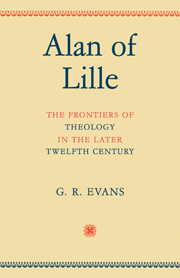Summary
Alan of Lille (d. 1202–3) possessed a richly-stocked and many-sided mind. The range of his learning impressed his contemporaries, to whom he seemed to ‘know everything knowable’. He was up-to-the-minute in his understanding of the latest technical developments in the study of the liberal arts in an age when technical skills were advancing rapidly; he was a good Aristotelian in his logic. But he was also greatly influenced by Thierry of Chartres and Gilbert of Poitiers, who had lectured on Boethius' theological treatises in the middle of the century. They, together with William of Conches in his lectures on Calcidius' commentary on Plato's Timaeus, had helped to bring about a revival of interest in Platonist ideas. If anything, the Platonist outweighs the Aristotelian in Alan; he saw the technical minutiae of his learning as part of a grand plan in which they were transformed into something finer and higher and made to serve a theology in which there was a good deal of Neoplatonic philosophy.
In his Marriage of Philology and Mercury, written in the Vandal Carthage of the late fifth century AD, the pagan Martianus Capella describes how the seven liberal arts can elevate the soul to be fit for heaven. That is Alan's view of them, too. With his poetry and his Platonism braced by a sound grasp of Aristotelian logic and Pythagorean mathematics, he set out to lead his readers to the heights of an intellectual heaven, where the divine is all intelligibility. Like Augustine, Alan is a Christian Platonist through and through.
- Type
- Chapter
- Information
- Alan of LilleThe Frontiers of Theology in the Later Twelfth Century, pp. vii - xPublisher: Cambridge University PressPrint publication year: 1983



